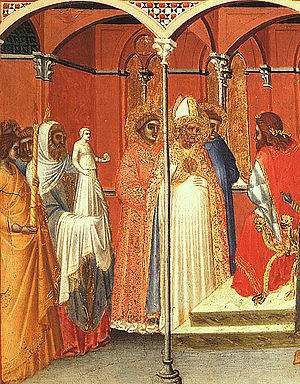Sabinus of Spoleto
Sabinus | |
|---|---|
 Saint Sabinus before Venustian, preaching the gospel. Pietro Lorenzetti. | |
| Bishop and Martyr | |
| Born | 3rd century AD |
| Died | c. 300 AD Spoletium, Roman Umbria (modern-day Spoleto, Umbria, Italy) |
| Venerated in | Roman Catholic Church |
| Canonized | Pre-Congregation |
| Feast | 7 December |
- for other saints called Sabinus, see Sabinus (disambiguation)
Saint Sabinus of Spoleto (died c. 300) was a Bishop in the Christian church who resisted the persecutions of Diocletian and was martyred.
According to legend, Venustian, governor of Etruria and Umbria, had Sabinus and his deacons arrested in Assisi. Diocletian's order required all Christians to sacrifice to the gods or be put to death, with their estates seized for the state. Venustian mocked Sabinus's faith, accusing him of leading the people to the worship of a dead man. When Sabinus said that Christ rose on the third day, Venustian invited him to do the same thing. He had Sabinus's hands cut off. The deacons were in great fear, but Sabinus encouraged them to hold to their faith, and they died after being torn apart by iron hooks. In prison after the martyrdom of his deacons, he was tended by a woman named Serena. While in prison, he healed a man born blind. Venustian heard of the cure and sought a cure for his own eyes from Sabinus. Sabinus healed the governor and converted him to Christianity. Venustian then sheltered Sabinus. Maximianus Herculius, hearing of this, ordered the tribune Lucius to address the matter. Lucius had Venustian, his wife, and his two sons beheaded at Assisi, and he had Sabinus beaten to death at Spoleto.
Sabinus's feast day in the Roman Catholic Church is 7 December.[1]
He is depicted in the Maestà of Duccio.
The Roman Martyrology lists six saints called Sabinus, three of whom were bishops. The other two are Sabinus of Canossa (d. c. 566, feast 9 February) and Sabinus of Piacenza (d. late fourth century, feast 11 December).
References
- ^ Martyrologium Romanum (Libreria Editrice Vaticana 2001 ISBN 88-209-7210-7)
Bibliography
- Englebert, Omer. "The Lives of the Saints." Anne and Christopher Fremantle, trans. Nihil obstat 1954. New York: Barnes & Noble, 1994, p. 494-495
